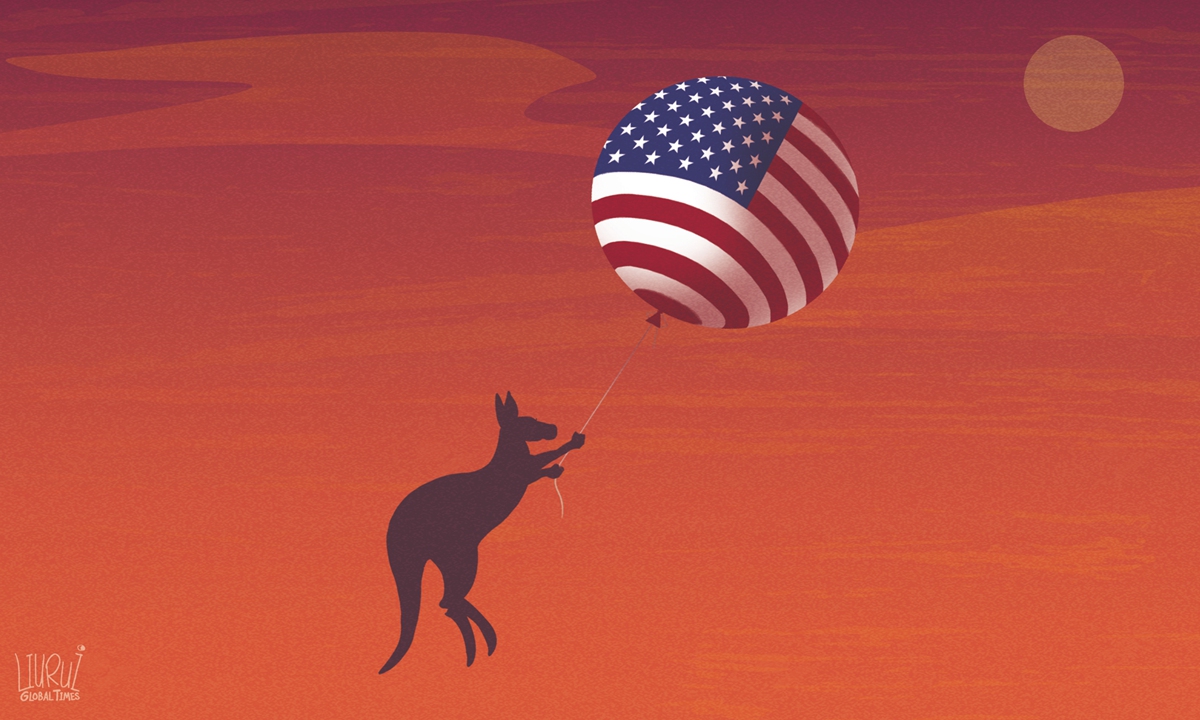True nature of Australia seems ironic in its own media
By Mu Lu Source: Global Times Published: 2020/12/17 11:53:40

Illustration: Liu Rui/GT
The Spectator Australia publication reported on Saturday that, "The second-to-last thing the Morrison government ever wanted to do was embroil our country in a trade war with China… The absolute last thing the Morrison government wants to do is sell out our national security."
Portraying China as a threat to Australia's national security and sovereignty reveals the tricks of Australian media outlets to put up and knock down a proverbial straw man. Actually, their real aim is to ramp up the "China threat theory" to Australia's regional hegemony and colonial remnants. This is completely a storyline of "a thief crying stop thief."
China has maintained close economic and political ties with many countries, with frictions with some though. This is normal in international exchanges. But few countries have made as much noise about China and their national security and sovereignty as much as Australia has.
Australia's current mind-set is somewhat similar to that of Japan in the 1990s when China started to rise, Yu Lei, chief research fellow at the research center for Pacific island countries of Liaocheng University in East China's Shandong Province, told the Global Times on Wednesday.
"When China started to rise, Japan became the first to spread the 'China threat' theory, and called for the enhancement of US-Japan alliance, hoping that Washington could increase its military presence in East Asia." Yu noted.
Changes to the China-US relationship have been the most important factor that led to tensions between China and Australia, Yu continued.
Australia's China policy is actually following in the footsteps of the US, but Canberra refuses to admit to it. In a self-deceiving way, the Morrison administration has always emphasized that, "we will always be Australia." Besides, it took free rides on heated topics trying to make up a scenario in which Australia sincerely wants to improve relations with China. However, in fact, Canberra has never showed any sincerity under Morrison's administration.
Australia's sense of superiority was completely revealed in the Spectator article titled, "The end of the affair, China and Australia have filed for divorce," which is really ridiculous. It is as if China is the one that will lose more due to the deterioration of China-Australia ties. With the philosophy of win-win, China has now become the largest trading partner in the world with more than 120 countries and regions. This is the result of market choices.
Australia is not the only one doing business with China. Many allies of Australia voiced support for Canberra while they simultaneously lined up to get a commercial contract with China. Of course, they were showing up to take away Australia's shares in key markets in China.
Exports are directly related to the employment and welfare of Australians. From this perspective, China is a major driving force for Australia's prosperity. The Australian government thought the China market could be easily replaced. This idea has been disputed by many economists, and rightly so.
India is often considered as a potential substitute to China. Australia has set a goal to send A$45billion in annual exports to India by 2035. But last year, Australia sold more than A$160 billion to China alone.
Australians in the past few years have always tended to overestimate their strength. They thought they were the more powerful side with advantageous position.
The Spectator's article also includes an offensive cartoon in which an old lady sits at a table and watches a mouse (representing China in the illustrator's eyes) eating a piece of cake. She seems at a loss what to do. In the illustration, the wines, steak, and lobsters on the table are covered with spider webs. Perhaps the cartoon was created in order to ridicule that China is fed by Australian goods. But it seems that the cartoon is sophisticatedly ironical to Australia itself.
Do the spider webs hint that Australia has lost its vitality, competitive edge, and attractiveness? Portraying China as a mouse indicates a distorted and ugly mentality of Australian elites. If this is the image of China in the mind of the illustrator, one might ask: what is the true nature of Australia that depends on China for prosperity?
The author is a commentator with the Global Times. opinion@globaltimes.com.cn
Posted in: VIEWPOINT,ASIAN REVIEW,OTHER REGIONS